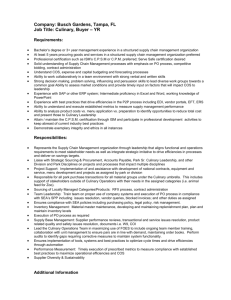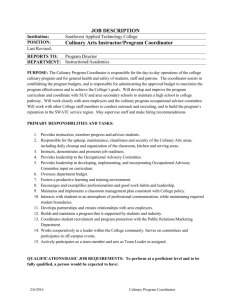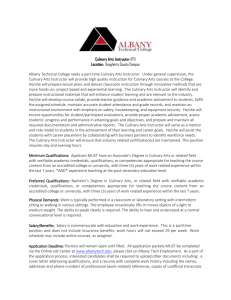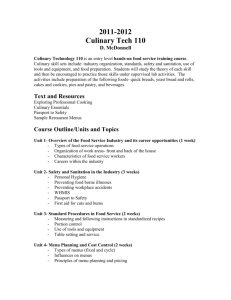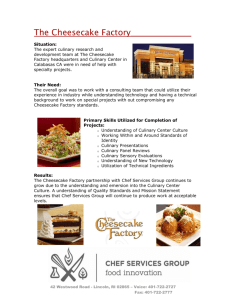COURSE SYLLABUS
advertisement
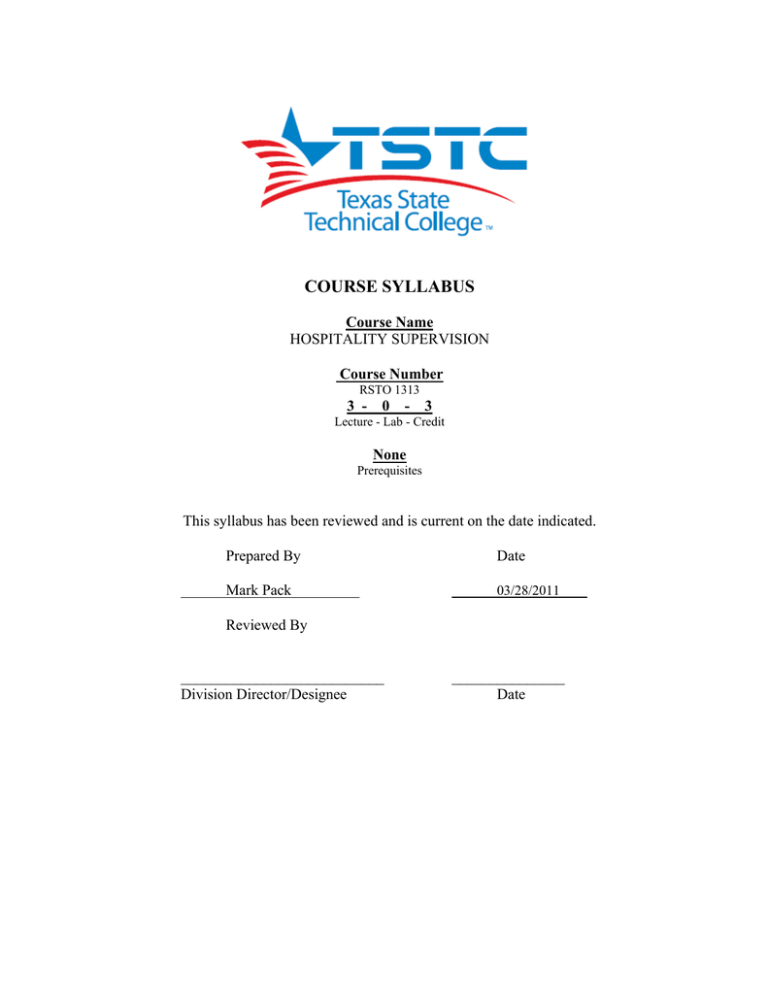
COURSE SYLLABUS Course Name HOSPITALITY SUPERVISION Course Number RSTO 1313 3 - 0 - 3 Lecture - Lab - Credit None Prerequisites This syllabus has been reviewed and is current on the date indicated. Prepared By Date Mark Pack 03/28/2011 Reviewed By ___________________________ Division Director/Designee _______________ Date I. Instructor Information Name: Majid Shavandy Phone: 325-670-9240 Campus Office: T&P Email: majid.shavandy@abilene.tstc.edu Office Hours: by appt Department Chair: II. III. Chair Email: Class Times, Location Tue, Wed, Thu 11:00 until 11:55 T&P, Culinary Institute Program Outcomes A. The TSTC Culinary Arts Graduate has been certified within the National Restaurant Association ServSafe Program, has received the Food Service Protection Management Card, and are able to perform safety and sanitation duties in accordance with the applicable health codes. B. The TSTC Culinary Arts Graduate is able to perform standard American Culinary Federation knife skill sets and have demonstrated basic fabrication techniques for meats, poultry, fish and shellfish categories along with carving and servicing techniques. C. The TSTC Culinary Arts Graduate is skilled in cooking methodology pertaining to dry and moist heat cooking, garde manger, baking, pastry, American regional, and International cuisine. The graduate is prepared to complete American Culinary Federation requirements to qualify as a Certified Culinarian. D. The TSTC Culinary Arts Graduate is able to convert, scale, plan, and cost recipes/menus. The graduate can also describe the impact associated with applied managerial cost control measures. E. The TSTC Culinary Arts Graduate has experienced the supervisory roles and responsibilities necessary for effective operation of both kitchen and 'front of the house' with a focus on customer service. F. The TSTC Culinary Arts Graduate has been trained in the proper use and maintenance of commercial food service tools and equipment. IV. Course Description & Introduction Fundamentals of recruiting, selection, and training of food service and hospitality personnel. Topics include job descriptions, schedules, work improvement, motivation, and applicable personnel laws and regulations. Emphasis on leadership development. V. Learning Outcomes The student will: A. Discuss the role of the supervisor including obligations to owners, customers, and employees The student will: • Explain the supervisor’s role • Distinguish between obligations and responsibilities of a supervisor • Determine the functions of management • • Discuss theories of people management Develop managerial skills B. Apply management theories and principles to the hospitality environment The student will: • Demonstrate training employees based upon different needs and levels • Explain Maslow’s Hierarchy of Needs • Access different styles of management to figure which style works best in which situation C. Identify and discuss principles of communication The student will: Define communication and explain its importance as a management tool Contrast formal and informal methods of communications Discuss the common forms of upward and downward communication used in the hospitality industry Outline circumstances that call for verbal, written and electronic communication methods List the common barriers to effective communication and describe techniques for overcoming such barriers Identify guidelines for providing positive and negative employee feedback • • • • • • D. Develop effective job descriptions, training plans, and evaluation instruments The student will: • Develop performance standards • Discuss other parts of the job description • Identify uses of the job description • Explain the importance, benefits, and problems of training • Discuss how employees learn best • Develop a job-training program • Discuss how to overcome obstacles to learning • Recognize purpose and benefits of evaluations • Discuss performance dimensions, standards, and ratings • Explain legal aspects of performance evaluation E. Relate principles of leadership The student will: • Define leadership and identify the similarities and differences between leadership and management • Discuss the evolution of leadership theories and their impact on modern management • Explain the difference between formal and informal authority • Evaluate the importance of adopting your own leadership style F. • • • • VI. Solve problems and build employability skills such as critical thinking, attitude, reading, work ethic, and writing The student will: Use critical thinking skills to complete assignments correctly and on time Exhibit a positive attitude in completing class work on time and correctly Exhibit professional principles by coming to class on time and calling in as required when absent Use critical thinking skills to identify and use methods, requirements, and standards to enhance productivity Assessment Methods & Grading Policy Test Participation Assignments Research 50% 20% 10% 20% 100% 90 – 100 = A 80 – 89 = B 70 – 79 = C 60 – 69 = D 59 or Below = F You must achieve a C or higher in Core Program Courses VIII. IX. Textbook/Reference Materials None Research Project None X. Class Participation Policy & Student Conduct Regular attendance is necessary for satisfactory achievement of the material presented in this class. Therefore, it is the responsibility of the student to attend lecture and laboratory sessions in accordance with requirements of the course as established and communicated by the instructor. A student who fails to meet these class participation requirements will earn a failing grade (F) in the course. The instructor is not required to provide the student with missed lecture material if he/she does not attend the class/lab session. Instructors cannot drop students or award grades of „W‟ for students based on non- attendance. Arriving late will count against you. You must attend the entire class period to receive all available points. Failure to meet either the required dress code, or failure to participate (this includes laying head on table or sleeping) will result in a loss of points on your participation grade. Professional courtesy requires that, if you have to miss a class or are going to be late you should call or e-mail BEFORE class. If you do not call or e-mail before class you may not make up any of the work. In other words, your participation is very important. XI. Safety • Campus building occupants are required to evacuate buildings when a fire alarm activates. Alarm activation or announcement requires exiting and assembling outside. • Familiarize yourself with all exit doors of each classroom and building you may occupy while receiving instructions. The nearest exit door may not be the door you used when entering the building. • Students requiring evacuation assistance should inform the instructor during the first week of class. • In the event of evacuation, follow the faculty’s or class instructor’s instructions. • Do Not re-enter a building unless given instructions by the Fire Department, Campus/Local Police, or Fire Prevention Services. XII. Special Needs If you have a condition, such as a physical or mental disability, which will make it difficult for you to carry out the work as outlined, or which will require extra time on examinations, please notify the Counseling and Testing Office during the first week of the course so that appropriate arrangements can be made. XIII. Course Schedule Week 1 Class info & Research project information Week 2 Chapter 1 & 2 review Week 3 Chapter 3 & 4 review Week 4 Test 1 Week 5 Chapter 5 & 6 review Week 6 Chapter 7 & 8 review Week 7 Test 2 Week 8 Chapter 9 & 10 review Week 9 Chapter 11 & 12 review Week 10 Test 3 Week 11 Chapter 13 & 14 review Week 12 Chapter 15 review Week 13 Test 4 Week 14 Research projects due Week 15 Final Exam XIV. Instructor CV Majid Shavandy Majid.shavandy@abilene.tstc.edu Experience • Deli- Cheese Dept- Café- Chef Prepared-FOH / Central Market • Co-Owner/Spice International Café, • Co-Owner/The Pegasus Restaurant & Bar, • Co- Owner/The Crazy Horse Café • General Manager/ Kathleen’s art cafe • Bar manager/ Le Chardonnay Restaurant • Asst. Gen. Mgr./ Viva’s

